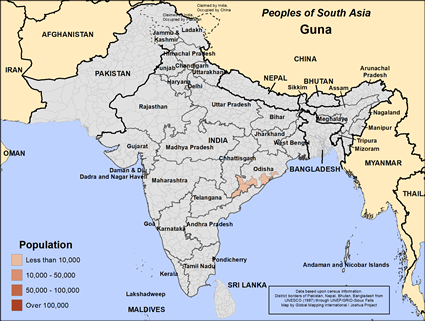Guna in India

Send Joshua Project a photo
of this people group. |

Map Source:
People Group data: Omid. Map geography: UNESCO / GMI. Map Design: Joshua Project
|
| People Name: | Guna |
| Country: | India |
| 10/40 Window: | Yes |
| Population: | 2,000 |
| World Population: | 2,000 |
| Primary Language: | Odia |
| Primary Religion: | Hinduism |
| Christian Adherents: | 0.00 % |
| Evangelicals: | 0.00 % |
| Scripture: | Complete Bible |
| Ministry Resources: | Yes |
| Jesus Film: | Yes |
| Audio Recordings: | Yes |
| People Cluster: | South Asia Hindu - other |
| Affinity Bloc: | South Asian Peoples |
| Progress Level: |
|
Introduction / History
The small, virtually unknown Guna community know very little about their past. They claim to have migrated from elsewhere, but they do not know when or from where. During feudal times they were probably soldiers or land owners. Their current status is in question, though it is low. However, they consider themselves to be a high caste, something that no other community would agree with.
Where Are they Located?
Today they live in settlements in the hills of southern Odisha. The climate tends to be cold, humid, rainy, and heavily forested.
What Are Their Lives Like?
The Guna people have only one gotra (clan), called Nagesa. They do, however, have several surnames. Men usually marry their cousins, and parents decide who marries who. After the wedding, the bride lives with her husband's family. The Guna usually have nuclear families rather than extended ones.
Guna women work hard, assisting their husbands and families. Like other rural Indian communities, women collect fuel and water. These women often find leaf-plates to sell to supplement the family income. The more fortunate members of this community hold government jobs or run grocery stories.
The Guna people do not have much in the way of their own art forms, though their women are adept at floor paintings and the men are skilled with ornate carpentry. They love folk tales and folk songs, but they seldom play instruments. Apart from the Danda Nacha, performed by men, they do not have their own folk dance.
They do not share water sources with other communities, which isolates them in a sense, since that means less contact. They also have roads that connect their communities with one another, making it more possible for them to remain culturally clustered.
What Are Their Beliefs?
Like many Hindu communities, the Guna people worship village and regional deities. When they go to a temple, they employ sacred specialists from higher communities.
What Are Their Needs?
The Guna people need the chance to excel spiritually through a relationship with Jesus Christ, the Light of the world.
Prayer Points
Pray for the Guna people to have a spiritual thirst that will lead them to gospel materials and Jesus Christ.
Pray that Guna elders will become followers of Jesus, throwing open the doors for others to follow Him as well.
Pray for workers to go to the Guna people with resources to help them transform their communities in ways that honor the Lord.